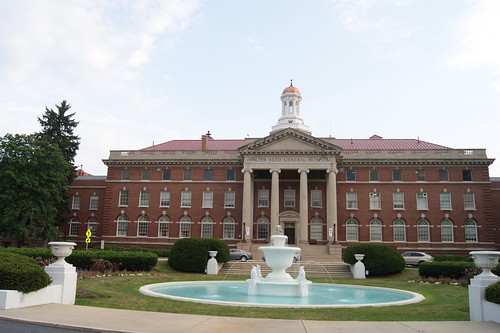Umm, duh, when military bases close, local businesses suffer

I know that media have to report on what is happening "now", but I remember back to high school, and reading about the impact of military base closures on local economies including the closure of air force bases in Michigan, which had been closed as the effects of the Cold War began to wane and the military no longer felt the need to have as many air force installations across the northern part of the U.S.
So it shouldn't be a surprise that restaurants and liquor stores are losing business now that the Walter Reed Medical Center has closed. See "Walter Reed closes, nearby businesses go bust" from WTOP Radio and the AOL story from 2005, "Military Base Closures and the Towns They Leave Behind."
From the AOL story:
When a military facility closes, the effects ripple throughout the surrounding community as families lose their neighbors, businesses lose their customers and workers lose their jobs. In a thriving city, a closure can be an adrenalin shot to the local economy as hundreds of acres of land are suddenly made available for municipal growth and expansion. But for many communities -- especially in rural or suburban areas -- closure can translate into years of struggle, as municipal planners strain to fill the empty spaces that the military leaves behind.
From the WTOP story:
Kate Singh, co-owner of Mayfair Liquors on Georgia Avenue near the hospital, says when Walter Reed essentially shut down, her business took a beating.
"It's like, you know, a tsunami came," she says. Singh says business is down 75 percent and she spends her days looking at the door. "I'm so overwhelmed. All day long, I'm looking at the door, and wondering is someone walking in here?"
She's had to let three employees go and now mans the store by herself.
The issue is that this was predictable and the impact on these businesses could have been mitigated with advanced planning and programs.
From the Congressional Research Service report, Military Base Closures: Socioeconomic Impacts:
The loss of related jobs, and efforts to replace them and to implement a viable base reuse plan, can pose significant challenges for affected communities. However, while base closures and realignments often create socioeconomic distress in communities initially, research has shown that they generally have not had the dire effects that many communities expected. For rural areas, however, the impacts can be greater and the economic recovery slower. Drawing from existing studies, this report assesses the potential community impacts and proposals for minimizing those impacts.
Granted, over time "DC" will recover greatly from being able to redevelop the military base into a mixed use community. But that will come at some individual cost, to owners of businesses like Mayfair Liquors, who won't be able to survive the 10 to 20 year process that redevelopment will take.
I don't know if the DC Office of Planning and Economic Development asked for mitigation monies to address the loss of business on Georgia Avenue in DC. I did write about this last year, spurred by a blog entry that Casey Anderson of Silver Spring wrote earlier last year. See "Impact of the closure of Walter Reed Hospital on Silver Spring."
I guess I should have considered mitigation issues then...



1 Comments:
nice information and positive thinking energy.
Post a Comment
<< Home